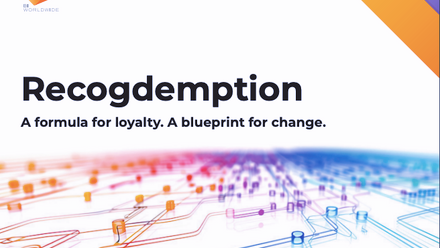What are the latest definitions of employee engagement and what impact does it have?

Employee engagement is more than just happy employees. There... we’ve said it.
For a long time, organisations have explored and analysed what it means to have staff that are engaged. Perhaps employee engagement means that staff work harder, are happier or even more productive?
These are all great things but what about the business? The organisation that delivers initiatives to make staff happier is often overlooked when in actual fact, the impact engaged staff can have on organisations is astronomical.
This is why we need to think about the business, not the employees for a change. This may not sit well with HR teams or the employees themselves, but when you look at the stats employee engagement can do wonders for businesses and goes beyond employee engagement scores. If your staff are engaged at work (whatever engagement means to you!), it can save you money.
Let’s take a look at the stats. We ran some research recently that revealed the benefit of engagement on both the employee and the wider business. The results speak for themselves: an employee earning the UK average salary of £27,600 could see an equivalent of a 13% pay rise if they were to take advantage of some of the employee benefits most relevant to them. As a result, their employer can look to save more than £125,000 a year through reduced absence, improved retention, lower administration costs and savings in VAT and National Insurance.
Engagement now a business imperative
If you take these results into consideration, it is clear to see that if you engage your staff, it will benefit your business. If staff can access discounts via their mobile phone, or call their EAP at a time that suits them, then they are likely to be happier, healthier and stick around for longer. This means that engagement is no longer a HR objective, it is a business imperative.
Benefits programmes are helping transform the wellbeing of staff too - engagement goes much further than discounts on food shopping. Our research demonstrates how a company with 1,000 employees can save more than £125,000 per year with the introduction of an employee services platform and a holistic wellbeing programme.
This is achieved through reduced absence, improved retention, lower administration costs and savings in VAT, NI and tax. An integrated benefits strategy, will not only go some way to reward and recognise staff so they feel valued and happier in the workplace, but can add significant value to the bottom line.
Simple methods to keep staff engaged
The good news is that businesses can employee simple methods to reward their staff and keep them engaged. According to Monster, the typical UK employer has 15% attrition (rising to a staggering 26% in some sectors).
With each employee costing an average of £5,433 to replace and analysis from Oxford Economics showing employers lose a further £25,000 in lost productivity during the first 28 weeks of each new hire, implementing a benefits programme to improve engagement levels could save organisations from this huge cost.
We tested the theory that engagement is good for business in our latest report: The Business of Engagement, improving productivity through people. We interviewed top UK business leaders to see what they thought about engagement and whether or not happiness really was good for business.
Alex Edmans, professor of finance at London Business School, reveals in the report that he “found that firms with high employee engagement delivered stock returns that beat their peers by 2.2 to 3.38% per year over a 28 year period - that’s 89% to 184% compounded.
So whether employee engagement is defined by happier staff, unlocking discretionary effort or high engagement scores – it is all subjective. This means that people can disagree or create their own ideal when it comes to what makes staff engaged. But when it comes to the benefit engagement has on businesses, the evidence is clear. Organisations that provide benefits to staff save money and their staff are happier and more productive - and that’s definitely good for business.
Katrina Philippou is communications manager at Personal Group.
This article was provided by Personal Group.
Supplied by REBA Associate Member, Personal Group
Personal Group provides the latest employee benefits and wellbeing products.







